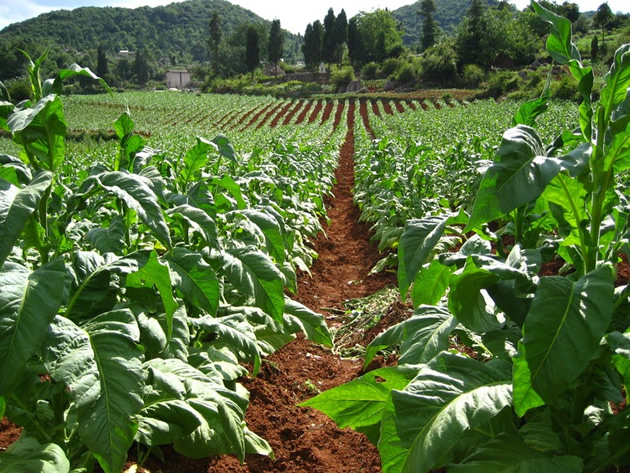Production must follow reclamation


Statistics show that communal and A1 farmers dominate deliveries to the tobacco auction and contract floors respectively
Lloyd Gumbo Mr Speaker Sir
Every revolution is bound to have some shortcomings during its implementation but integrity is about biting the bullet and addressing the same regardless of how unpopular the decision may appear to any constituent.
What is important is that it should be for the greater good.
It is a fact that the fast-track land redistribution exercise was influenced by the need to correct the colonial and racially skewed agricultural land ownership that saw a few thousands white farmers occupy around 80 percent of arable land despite the fact that the majority of it was underutilised.
Meanwhile, the majority of Zimbabweans were still living in anguish as they could not earn a living out of the unproductive land.
As such when the fast-track land redistribution exercise started it had no formula as the landless Zimbabweans jumped at once to reclaim the land at the turn of the millennium.
This resulted in some senior officials and ordinary villagers grabbing huge tracts of land, regrettably the majority of which has remained underutilised or wholly un-utilised.
A look at the late Amos Midzi’s farm in Beatrice and former Mashonaland West Governor Nelson Samkange’s farm along Chinhoyi road could be a reflection of how productive land is lying idle.
The success of the land redistribution exercise will be judged on production and not occupation.
It is disheartening that a lot of productive land is lying idle at a time the country needs food because some beneficiaries have not been able to fully use the land.
A significant pitfall with the fast-track land redistribution exercise was that the land was in good faith, given to some people who then had little knowledge or capacity to produce and less so, contribute to national economic development.
As a result, some of the beneficiaries who thought agriculture was about harvesting low hanging fruits found it laborious and resource-demanding to the extent that they have failed to use the land fully.
While financial resources have always been the exit excuse, lack of passion for agriculture among some of the beneficiaries is the major reason we are not yielding much.
Mr Speaker Sir, the major culprits on this one are the elite including some MPs and ministers who claimed huge tracts of land but are only utilising about a third if not smaller of the whole farm.
According to the Zanu-PF election manifesto for the July 31, 2013 harmonised elections, 976 500 individuals are A1 beneficiaries who shared 4 million hectares of land while 113 802 were allocated A2 farms, sharing about 3,5 million hectares of land.
Several studies including those by land redistribution advocates, indicate that smallholder farmers are the ones who have contributed to the country’s economy compared to their A2 counterparts.
Statistics show that communal and A1 farmers dominate grain and tobacco deliveries to the Grain Marketing Board and tobacco auction and contract floors respectively.
The nagging question then is where are the A2 farmers, some of whom found necessary infrastructure including irrigation facilities when they moved into those farms?
Aren’t they the same people who also benefited from the farm mechanisation programme?
Why are their farms idle in winter when they have irrigation facilities in place?
Should they still be mourning about drought when the effects of climate change have been with us for years?
Some of them have been at the farms for the past 15 years and what investment have they put up at the farms as part of their climate change adaptation strategies?
Mr Speaker Sir, drought has been attributed to the poor yields experienced in the last few years but what happened to the irrigation facilities that were at some of the farms?
Obviously we are experiencing the same climatic conditions with our neighbours such as Zambia yet they are producing excess for export.
It is actually an indictment on some of our elite farmers that we are importing grain from Zambia when we should be exporting regardless of the climatic conditions.
Mr Speaker Sir, land is our economy as such we should be decisive when dealing with this God-given resource.
If an audit on A2 farm utilisation were to be conducted it is almost certain that more than 60 percent of the beneficiaries would be found to be utilising less than 50 percent of the total land size.
It is difficult to buy that excuse of lack of finance because some of the beneficiaries have been on the farms for more than a decade, do they mean to say they have not been producing all these years?
These are people who should know better that agriculture is a business of which savings are of paramount importance.
There is every need for Government to bite the bullet and address the issue of farm sizes without fear or favour.
It is clear that some of the A2 beneficiaries have been found wanting as such, those pieces of land must be significantly reduced to broaden the land ownership base if the country is to fully benefit from the land redistribution exercise.
I have raised the issue of farm sizes on this column before and I still insist that more than 100 hectares of land is too big for an individual regardless of their status.
So many Zimbabweans are in need of land but are told that there are no more vacant farms.
Mr Speaker Sir, it is therefore sweet news that Government is in the process of reducing farm sizes but the proposed remainder are still too big for individuals considering that just over 1 million individuals have benefited in a population of not less than 13 million people.
As such, while the reduction of farm sizes to about 500 hectares is a noble idea there is still need for the Government to consider seriously reducing them further to about 100 hectares maximum to allow broad-based empowerment that Government wants to achieve.
The problem at the moment is that some A2 farmers are holding on to these huge tracts of land for status and self-esteem while the majority of Zimbabweans are wallowing in poverty because the same farmers are failing to produce enough to feed the nation.








Comments